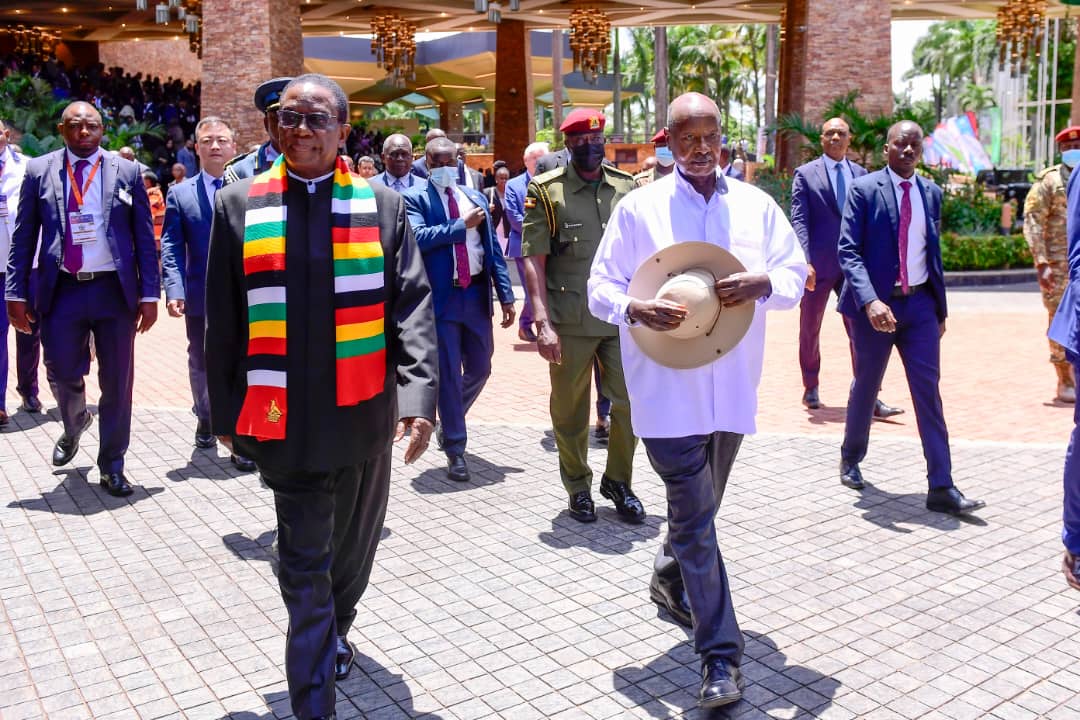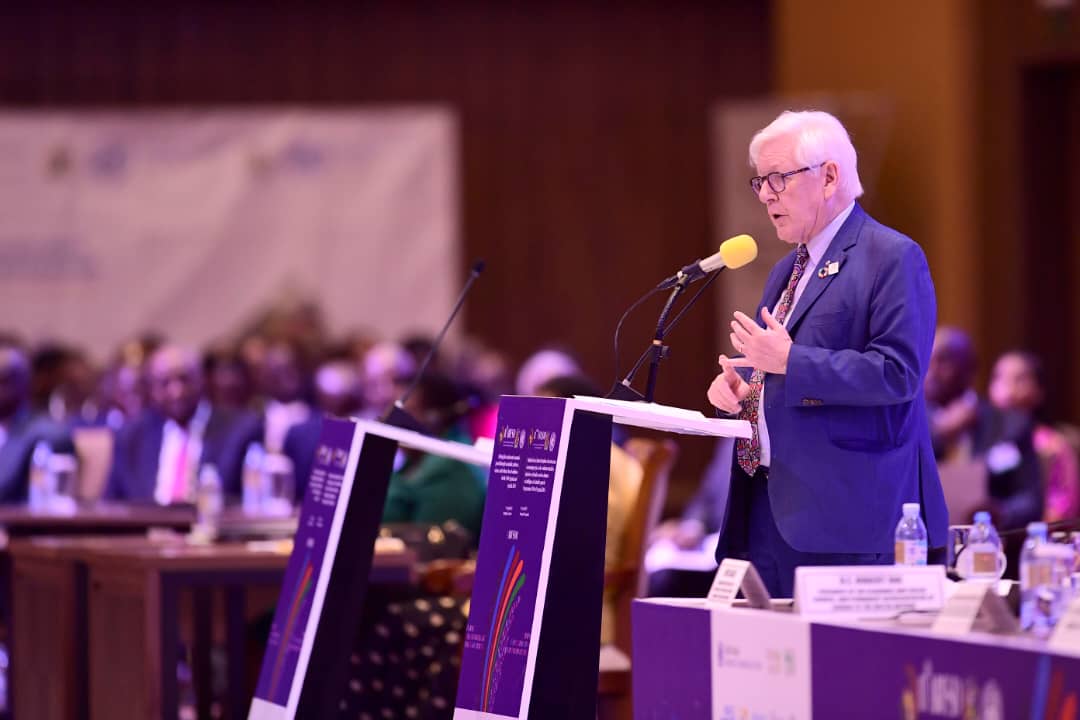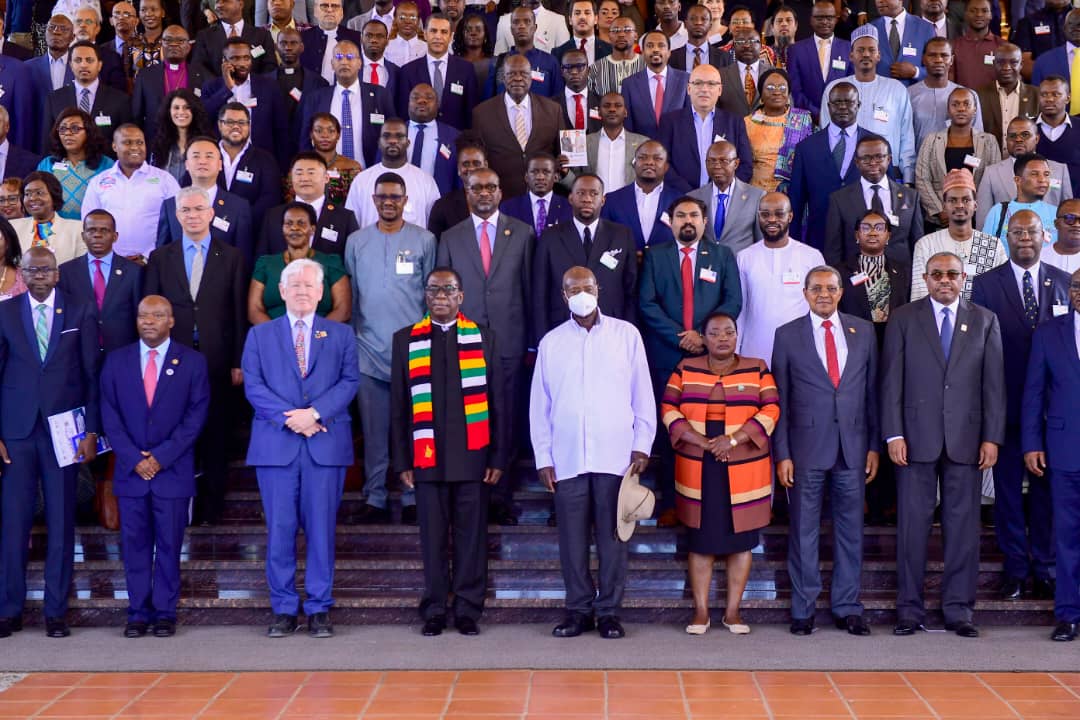President Yoweri Kaguta Museveni has called on African nations to take charge of their development agendas through homegrown solutions and regional integration. He noted that external support, while helpful, is not a guarantee for sustainable progress in Africa. The President made the remarks today while officiating at the 11th Session of the Africa Regional Forum on Sustainable Development (ARFSD-11), which took place at the Speke Resort Convention Centre in Munyonyo, Kampala.
The three-day forum is held under the theme: “Driving job creation and economic growth through sustainable, inclusive, science and evidence-based solutions for the 2030 Agenda and Agenda 2063”. The Africa Regional Forum on Sustainable Development (ARFSD) is an annual platform convened by the United Nations Economic Commission for Africa (UNECA) in collaboration with the African Union and host governments.
At the event, the President was in company of the First Lady and Minister of Education and Sports, Maama Janet Museveni and H.E Emmerson Dambudzo Mnangagwa, the President of the Republic of Zimbabwe.
“The solutions are with us,” Museveni emphasized. He recounted a recent disagreement between Uganda and some Western countries following the enactment of legislation concerning homosexuality. “We had an argument with Europeans recently. We passed a law which was discussing homosexuality here. Then the United States removed us from the AGOA list, and they chased us. The World Bank stopped giving us loans, but our economy still grew by 6%.”
According to the President, Uganda’s resilience amid global criticism demonstrates that the country and indeed Africa can achieve progress even in the absence of external aid. “What’s crucial for me, apart from our own mistakes, is regional integration. If we avoid them, we can go far,” he added.
Museveni highlighted that Uganda’s economy has developed rapidly, with or without foreign assistance. The President explained that his government had to start from scratch, rehabilitating a broken economy while bringing the rest of the population into productive activity. He noted that the NRM has since made notable strides: first, restoring the enclave economy by reviving some of the 3Cs and 3Ts.
Secondly , he noted that expanding them where possible for instance, coffee exports have risen from 3 million bags in 1986 to 9 million today; thirdly , diversifying the economy through commercial production of milk, beef, leather, maize, fruits, and fish, among others and fourthly , adding value to raw materials; and fifth, transitioning into a knowledge economy, with innovations such as manufacturing of vehicles, vaccines and computers.
He added that a major challenge the government faced was the large share of the population that was still engaged in subsistence production. As of 2013, 68% of homesteads were outside the money economy. This he said that the government introduced Operation Wealth Creation (OWC), mobilizing the army to distribute free planting materials and breeding stock to households, citing that this approach later evolved into the Parish Development Model (PDM), a more sustainable and community-based strategy which organizes wealth-creation SACCOs at the parish level.

Using intensive agriculture, the President noted, a single acre can generate employment for up to fifteen people. “Uganda has 40 million acres suitable for agriculture. If we use only 7 million of these acres, 105 million jobs will be created. This is more jobs than the entire population of Uganda, which stands at 46 million,” he said.
President Museveni also stressed that agriculture is not the only source of wealth and employment. Uganda’s economic growth also rests on three other pillars: industry and artisanship; services; and ICT.
Currently, he highlighted that agriculture employs 3.6 million people, industry 1.4 million, services 5 million, and ICT over 46,000 people. He concluded by warning that mere quantitative growth is insufficient thus Sustainable growth without transformation is a recipe for perpetual underdevelopment.
On his part, Mr. Robert Keith Rae, Canada’s Ambassador and Permanent Representative to the United Nations, stressed the central role Africa plays in achieving the Sustainable Development Goals (SDGs).Mr. Rae acknowledged that while progress towards the SDGs is being made, the path forward remains challenging. He emphasized the importance of continued collective effort to overcome these obstacles.
“We must recognize that the climate crisis is real. Climate change is not an ideology; it’s science. We must confront these facts and work together to help countries adapt and thrive,” he said. As the President of the UN Economic and Social Council (ECOSOC), Mr. Rae expressed Canada’s commitment to supporting African nations in their efforts to tackle these critical challenges.
The Deputy Secretary-General of the United Nations, H.E. Amina Mohammed, also called on African leaders and stakeholders to confront the hard truths surrounding development financing and to adopt courageous, homegrown solutions to accelerate progress on the Sustainable Development Goals.
She acknowledged the persistent financing gaps hindering Africa’s development, noting that the annual shortfall in resources required to achieve the SDGs remains a significant challenge.
“More than 60% of African countries are spending a substantial portion of their revenues on debt servicing. This reality cannot be ignored. But these figures do not define us,” she said.
She praised the resilience and leadership of women across the continent, stating that women are at the forefront of change, breaking barriers and addressing long-standing inequalities.

She also emphasized the urgency of addressing gender-based violence and protecting the rights of women and girls. “Limiting violence against women and girls must be a top priority. Women are not just beneficiaries of development; they are drivers of it.”
On his part, Mr. Claver Gatete, the Executive Secretary of the United Nations Economic Commission for Africa applauded Uganda’s development efforts and President Museveni’s unwavering commitment to Africa’s broader priorities.
Mr. Gatete expressed deep gratitude to the people of Uganda for their resilience and progress on the development journey. “It is my privilege to address this session, I would begin by extending my heartfelt appreciation to the people of Uganda for their resilience and commitment to development, I also commend President Museveni for his continued support towards Africa’s transformation agenda,” Mr. Gatete said.
He stressed the importance of gender equality, highlighting that women hold only 26% of parliamentary positions across the continent, an imbalance that must be addressed urgently. To meet SDG targets, Mr. Gatete outlined four strategic pillars including Curtailing Illicit Financial Flow, Releasing Domestic Capital, Expanding Access to Finance, Especially for Women and Youth and Harnessing the African Continental Free Trade Area (AfCFTA).
The event was also attended by the Prime Minister, Rt. Hon Robinah Nabbanja, 3rd Deputy Prime Minister, Rt. Hon. Rukia Nakadama, Ministers, among other dignitaries.




